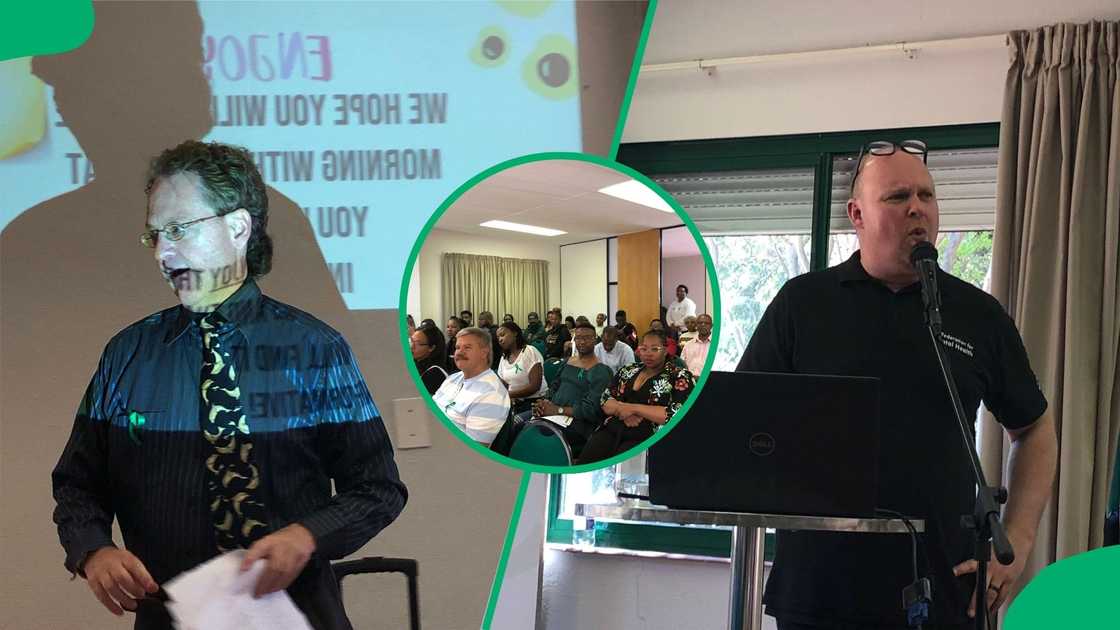- In Randburg, Johannesburg, South Africa celebrated World Mental Health Day on Thursday, October 10, 2024.
- A meaningful dialogue brought together key mental health stakeholders under the banner of the South African Federation for Mental Health.
- South Africa faces an economic loss of roughly R161 billion annually due to mental, neurological, and substance use disorders.
- Briefly News covered the event, highlighting workplace mental health issues and featuring exclusive interviews.

JOHANNESBURG — South Africa joined the global community in celebrating World Mental Health Day on Thursday, October 10, 2024. This important day served as a reminder of the critical need to prioritize mental health, especially in the workplace, where the stressors of modern life can take a toll on employees.
The event in Randburg focused on the theme "It's Time to Prioritize Mental Health in the Workplace." It highlighted the alarming statistics from the World Health Organization (WHO), which indicate a rising number of work-related mental illnesses and their significant economic impact. The conversation wasn’t just about raising awareness but also about finding actionable solutions to improve employee wellness.
Why Workplace Mental Health Matters
The workplace can be a double-edged sword when it comes to mental health. While it offers structure and purpose, it can also create stress due to discrimination, overwhelming workloads, and limited job control. According to the WHO, approximately 15% of working-age adults experienced a mental disorder in 2019, a figure that underscores the urgency of addressing mental health in the workplace.
Read also:Unlikely Companions The Friendship Between Martha Stewart And Snoop Dogg
Poor mental health doesn’t just affect individuals; it ripples through organizations, impacting performance, increasing staff turnover, and leading to absenteeism. Globally, depression and anxiety alone cost the economy $1 trillion annually in lost productivity. In South Africa, the economic burden of mental, neurological, and substance use disorders is staggering, amounting to about R161 billion each year.
So, what can be done? The WHO suggests several strategies to protect mental health in the workplace:
- Manager Training: Equip managers with the tools to recognize emotional distress, foster open communication, and understand job stressors.
- Employee Education: Train employees in mental health literacy to reduce stigma and improve awareness.
- Psychosocial Support: Offer programs that help employees manage stress, reduce symptoms of mental health disorders, and encourage leisure-based physical activity.
These interventions are not just beneficial but essential for creating a healthier, more productive work environment.
SAFMH Takes the Lead
The South African Federation for Mental Health (SAFMH), a human rights-focused nonprofit based in Ferndale, led the discussions on World Mental Health Day. The organization invited a wide range of stakeholders to participate in the dialogue, emphasizing the importance of collaboration in addressing mental health challenges.
Briefly News covered the event extensively, capturing exclusive interviews and testimonies that highlighted the profound impact of workplace mental health. Cape Mental Health Chief Executive Officer Dr. Ingrid Daniels emphasized the universal nature of mental health challenges, saying, “Every employee, at some level, is susceptible to mental health issues. Employers and workers must prioritize mental health in the workplace to support each other during difficult times.”
“We’ve all been affected in one way or another, and the COVID-19 pandemic was a clear example of that—it leveled the playing field. Our goal is to reduce the prevalence of mental health conditions, treating them with the same seriousness as medical conditions like high blood pressure or diabetes.”
Dr. Daniels also stressed the importance of prevention, stating, “Mental health is a journey, and no one is immune. We aim not only to reduce but also to prevent mental health issues before they develop into diagnosable conditions.”
Read also:Understanding Stray Kids Ages All You Need To Know About The Members
Early Childhood and Mental Health
Pietermaritzburg Mental Health executive director Philippa Manning offered a compelling perspective on the origins of mental health issues, emphasizing the role of early childhood experiences. “The way a child is nurtured, stimulated, and loved—or neglected—can shape their mental health outlook later in life,” she explained.
“Many societal problems stem from adverse childhood experiences. Instead of focusing solely on biological factors, we need to address the social issues that contribute to mental health challenges. Educating parents is key, as they often lack the knowledge to understand how negativity and absence can impact their children.”
Creating a Conducive Work Environment
Chipo Gwaza, director at the Association for the Rehabilitation of Persons with Disability (REHAB), pointed out the importance of balancing work, sleep, and leisure in a 24-hour day. “Workplace mental health is crucial because it’s where we spend the majority of our time,” she noted. “To foster good mental health, we must consider factors outside the workspace, such as technological advancements and societal changes.”
“Creating a conducive environment isn’t just about what happens at work; it’s about understanding the broader context of an employee’s life.”
Jannie van Zyl, director at Northern Cape Mental Health Society, emphasized the need for a holistic approach to mental health in the workplace. “No one can predict whether they’ll develop a mental illness, whether it’s anxiety, depression, or something else. The reality is that anyone can be affected,” he said.
“It’s essential to assess the mental health of both staff and service users. Start with management, move to the staff, and ultimately focus on the service users. Prevention is key, and while we can’t predict everything, we can take proactive steps to create a supportive environment.”
A Tragic Reminder
In a related and sobering development, Briefly News reported the tragic suicide of a Standard Bank worker who jumped from the company’s Rosebank office building in Johannesburg on Monday, October 14. The woman had reportedly confided in colleagues about her unhappiness at work before taking her own life. This incident serves as a stark reminder of the importance of addressing mental health challenges in the workplace.
As South Africa and the world continue to grapple with mental health issues, it’s clear that proactive measures and open conversations are vital. World Mental Health Day is not just a day for reflection but a call to action for individuals, organizations, and communities to work together toward a healthier, more supportive future.


